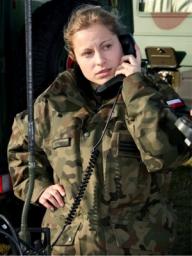The Sister, The Soldier
" My sister is a soldier. I remember when she came home and told our mother that she was going into the army. My mother said, “You’re too young. It’s too hard.”
My sister Darlene said, “I’m 18. That’s old enough to go. And if I go I’ll be able to get a better job. Right now, all I can do is work part-time. I need a real job. I need a good one. This one isn’t going anywhere.”
My mother cried. She said, “There is a war. You could have to go there to fight.”
I said, “Don’t worry. They don’t send girls to fight in wars. If it was me that would be different.”
Darlene said, “Don’t worry. I’m careful.”
But my mother stayed worried. My sister went to training camp. When she came back, she looked happy. I asked her what it was like.
“Well, we have to get up very early. I get up at 5:00 every morning. Then we do exercises. Then we drill a lot. You have to be on time. You have to follow all the directions. I like the people in my unit. They help each other out.”
My mother said, “I’m proud of you. But I’m still worried.”
“Don’t worry, mom. If I do get sent to the war I’ll be careful.”
My sister went to war. Her unit was sent to Iraq. I had no idea where that was. But I looked it up on a globe in the school library. Iraq is on the other side of the world.
My sister bought us a computer before she left. She showed us how to use it to send email. I’m so glad she did that. We can send notes to her on it. She sends us back a note. She tells us about the weather and the people. Here’s what she put in one note.
“It’s hot here. We have to wear heavy clothes, though. They are to keep us safe. Most of the people here are very nice. And the soldiers are great friends. Don’t worry. I’m being careful. See you in September.”
She would end every note that way—see you in September. But then September came. Then she wrote to us, “We have to stay longer. I’m not sure how soon I’ll be back. But I’m being careful.”
My mother went on the email every day for the next week and didn’t get a message. She was getting more and more worried. Then she got a note. “I’m fine. They sent us on a trip. Sorry I couldn’t email. Don’t worry. I’m being careful.”
So it went on. And we waited. I worried, too. I would see news about the war on TV. It looked dangerous. Sometimes I would see that my mother was crying.
October went by. Then November. Then it was December. My mother bought some presents for
my sister. She mailed them to her. She said, “I really wish Darlene could be here for Christmas.” Every time the phone rang or someone knocked on the door, she hoped it might be Darlene coming home by surprise. But she didn’t get her wish. So Christmas was kind of sad.
Then on New Year’s eve, the doorbell rang. We ran to open it. My mother said later she was a little afraid every time the doorbell rang that it might be someone to tell her bad news, that there was a problem with Darlene. But this was the opposite. This was the best news. It was Darlene!
We’ll have a really happy new year now.
